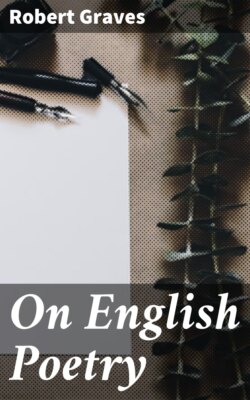Читать книгу On English Poetry - Robert Graves - Страница 4
На сайте Литреса книга снята с продажи.
II
THE NINE MUSES
ОглавлениеTable of Contents
I SUPPOSE that when old ladies remark with a breathless wonder “My dear, he has more than mere talent, I am convinced he has a touch of genius” they are differentiating between the two parts of poetry given at the beginning of the last section, between the man who shows a remarkable aptitude for conjuring and the man actually also in league with the powers of magic. The weakness of originally unspontaneous poetry seems to be that the poet has only the very small conscious part of his experience to draw upon, and therefore in co-ordinating the central images, his range of selection is narrower and the links are only on the surface. On the other hand, spontaneous poetry untested by conscious analysis has the opposite weakness of being liable to surface faults and unintelligible thought-connections. Poetry composed in sleep is a good instance of the sort I mean. The rhymes are generally inaccurate, the texture clumsy, there is a tendency to use the same words close together in different senses, and the thought-connections are so free as to puzzle the author himself when he wakes. A scrap of dream poetry sticks in my mind since my early schooldays:
“It’s Henry the VIII!
It’s Henry the VIII!
I know him by the smile on his face
He is leading his armies over to France.
Here eighth and face seemed perfect rhymes, to the sleeping ear, the spirit was magnificent, the implications astonishing; but the waking poet was forced to laugh. I believe that in the first draft of Coleridge’s Kubla Khan, Abora was the rhyme for Dulcimer, as:—
“A damsel with a dulcimer
Singing of Mount Abora”
because “saw” seems too self-conscious an assonance and too far removed from “Abora” to impress us as having been part of the original dream poem. “Could I revive within me” again is surely written in a waking mood, probably after the disastrous visit of the man from Porlock.
Henceforward, in using the word Poetry I mean both the controlled and uncontrollable parts of the art taken together, because each is helpless without the other. And I do not wish to limit Poetry, as there is a new tendency to do, merely to the short dramatic poem, the ballad and the lyric, though it certainly is a convenience not to take these as the normal manifestations of Poetry in order to see more clearly the inter-relation of such different forms as the Drama, the Epic, and the song with music. In the Drama, the emotional conflict which is the whole cause and meaning of Poetry is concentrated in the mental problems of the leading character or characters. They have to choose for instance between doing what they think is right and the suffering or contempt which is the penalty, between the gratification of love and the fear of hurting the person they love, or similar dilemmas. The lesser actors in the drama do not themselves necessarily speak the language of poetry or have any question in their minds as to the course they should pursue; still, by throwing their weight into one scale or another they affect the actions of the principals and so contribute to the poetry of the play. It is only the master dramatist who ever attempts to develop subsidiary characters in sympathy with the principals.
The true Epic appears to me as an organic growth of dramatic scenes, presented in verse which only becomes true poetry on occasion; but these scenes are so placed in conflicting relation that between them they compose a central theme of Poetry not to be found in the detachable parts, and this theme is a study of the interactions of the ethical principles of opposing tribes or groups. In the Iliad, for instance, the conflict is not only between the Trojan and Greek ideas, but between groups in each camp. In the Odyssey it is between the ethics of sea-wandering and the ethics of the dwellers on dry land. I would be inclined to deny the Beowulf as an epic, describing it instead as a personal allegory in epical surroundings. The Canterbury Tales are much nearer to an English Epic, the interacting principles being an imported Eastern religion disguised in Southern dress and a ruder, more vigorous Northern spirit unsubdued even when on pilgrimage.
The words of a song do not necessarily show in themselves the emotional conflict which I regard as essential for poetry, but that is because the song is definitely a compound of words and music, and the poetry lies in this relation. Words for another man’s music can hardly have a very lively independent existence, yet with music they must combine to a powerful chemical action; to write a lyric to conflict with imaginary music is the most exacting art imaginable, and is rather like trying to solve an equation in x, y and z, given only x.
I wonder if there are as many genuine Muses as the traditional nine; I cannot help thinking that one or two of them have been counted twice over. But the point of this section is to show the strong family likeness between three or four of them at least.
